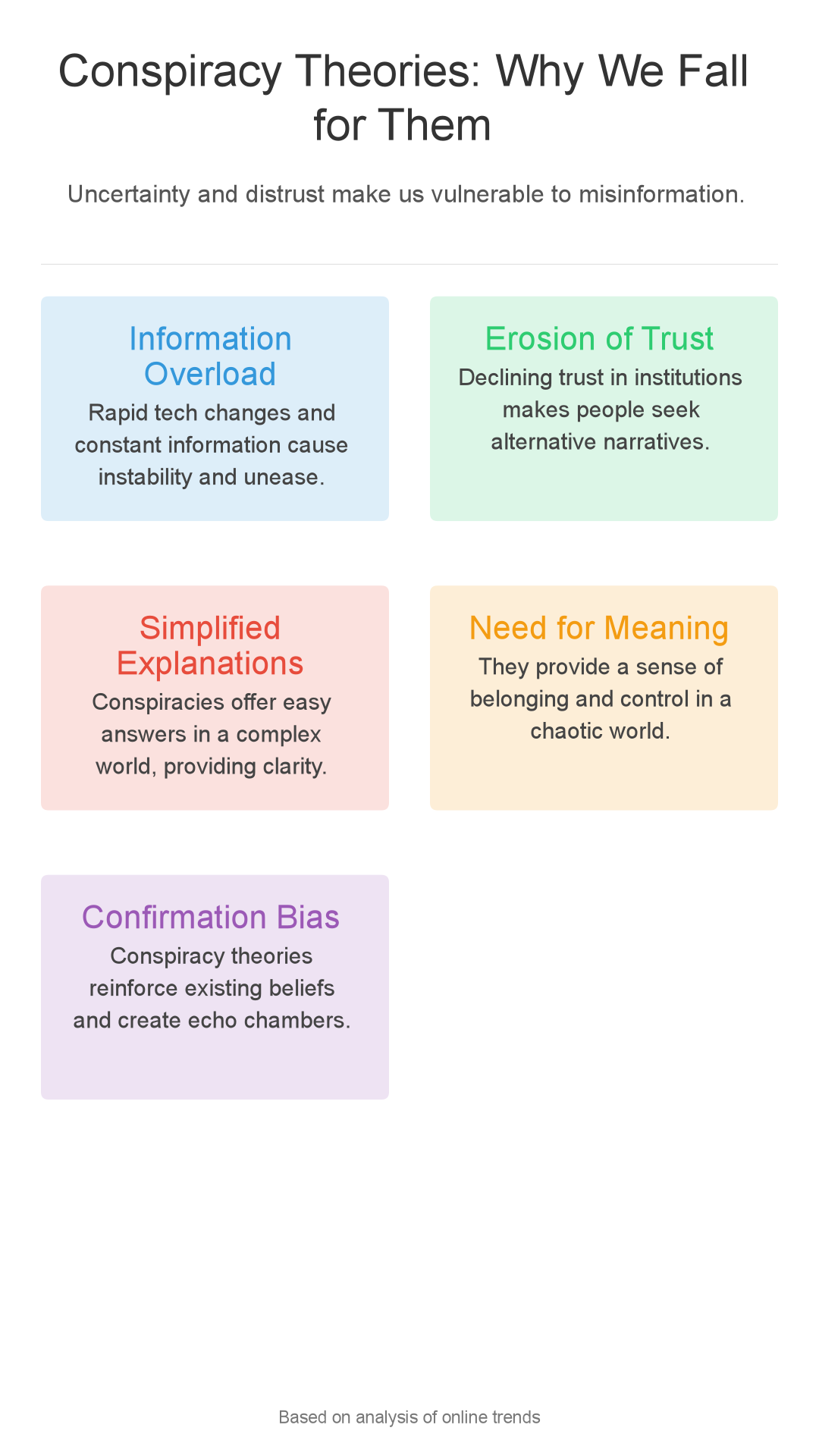
Ever feel like reality is gaslighting you? Like you're being told one thing, but your gut screams an
Ever feel like you’re living in a world where the truth is… debatable? Like reality itself is glitching, and you’re the only one who notices? You’re not alone. That unsettling feeling of disorientation is precisely what conspiracy theories latch onto. Hit that like button if you’ve ever questioned what’s real! And follow for more explorations into the internet’s hidden corners.
Let’s be honest. Have you ever been scrolling through social media and felt like you’ve stumbled into an alternate version of your own life?
It’s a disorienting feeling, like you’re constantly trying to catch up with a reality that’s just slightly off-kilter. It turns out, that very feeling of being out of sync makes us vulnerable to conspiracy theories.
The “Gaslighting” of Modern Life: Fueling Doubt and Uncertainty
We live in an age of unprecedented information overload. It’s like trying to drink from a firehose, and frankly, it’s exhausting.
Rapid Technological Advancements, Information Overload, and Polarized Media
Consider this: one minute, you’re trying to understand the latest TikTok craze; the next, you’re bombarded with alarming news about AI potentially reshaping society.

. It’s enough to leave anyone feeling adrift.
The relentless pace of technological change and the sheer volume of information we’re exposed to daily foster a sense of instability.
Erosion of Trust in Traditional Institutions
Remember when we could (mostly) trust the news to present objective facts? Those days feel long gone. The declining trust in government, media, and even scientific institutions is a critical factor.
When people feel like they’re being misled or manipulated by those in power, they become more susceptible to alternative narratives, no matter how outlandish they may seem.
Examples: Political Polarization and Social Media Echo Chambers
The 2020 US election provides a stark example. Regardless of political leaning, the pervasive distrust and accusations of fraud fostered a fertile ground for conspiracy theories concerning rigged voting machines and shadowy conspiracies.
Similarly, social media algorithms curate our feeds to prioritize content we already agree with, reinforcing existing biases and creating echo chambers where dissenting opinions are suppressed.
Conspiracy Theories Offer False Clarity and Control
So, why are conspiracy theories so appealing? Because they provide something increasingly scarce in modern life: a sense of clarity and control.
Simplified Explanations for Complex Events
Life is messy. Politics are complex. But conspiracy theories offer a seemingly neat and tidy explanation for everything.
Instead of grappling with the intricacies of geopolitical strategy, you can simply attribute it all to a secret cabal pulling the strings.

.
Identifying a Clear “Enemy” and a Sense of Belonging
Conspiracy theories often identify a clear “enemy,” be it the government, the media, or a specific group. This provides a target for anger and frustration, and it also cultivates a sense of solidarity among believers.
Suddenly, you’re not alone; you’re part of a group of “enlightened” individuals fighting against the forces of evil.
The Illusion of Control
In a world that often feels chaotic and unpredictable, believing you understand a hidden agenda can give you a sense of power. Even if that agenda is entirely fabricated, the act of “knowing” the “truth” provides a feeling of control over events.
It’s like saying, “I may not be able to change the world, but at least I know what’s *really* going on.
Psychological Vulnerabilities: Targeting Distrust and the Need for Meaning
Not everyone is equally susceptible to conspiracy theories. Certain psychological vulnerabilities make some individuals more prone to embracing these narratives.
Pre-existing Distrust of Authority and Paranoia
Individuals who already distrust authority figures or exhibit a tendency towards paranoia are more likely to be drawn to conspiracy theories. They are predisposed to believe that powerful institutions are concealing information, making it easier for them to accept the notion of a secret agenda.
The “Need for Cognitive Closure”
Psychologists describe the “need for cognitive closure” as the desire for quick, definitive answers, even if those answers are inaccurate. In a world of constant uncertainty, this need can become incredibly compelling.
Exploitation of Confirmation Bias
Confirmation bias is the tendency to seek out information that confirms our pre-existing beliefs and to disregard information that contradicts them.
Conspiracy theories exploit this bias by presenting “evidence” that supports the narrative, even if that evidence is weak or fabricated.
The Echo Chamber Effect: Reinforcing Beliefs and Isolating Individuals
The internet, while a source of noteworthy information, can also be a breeding ground for misinformation and echo chambers.
Online Communities Dedicated to Conspiracy Theories
Online communities centered around specific conspiracy theories create echo chambers where dissenting opinions are suppressed.
Anyone who questions the narrative is often labeled a “sheep” or a “shill,” fostering a hostile environment for critical thinking.
Algorithms Amplifying Narratives
Social media algorithms are designed to show us content that we’re likely to engage with. Consequently, if you begin showing an interest in conspiracy theories, the algorithm will flood your feed with more and more of that content, further reinforcing those beliefs.
Social Isolation and Dependence on the Conspiracy Community
As individuals become more deeply entrenched in conspiracy theories, they often become isolated from mainstream society. Their friends and family may not understand or support their beliefs, leading to social alienation.
So, how do we combat this? It’s not about ridiculing people or dismissing their beliefs. It’s about fostering critical thinking skills, encouraging diverse perspectives, and rebuilding trust in reliable sources.
What steps are you actively taking to combat misinformation in your own life? Share your thoughts in the comments below! And if you found this dive into the weird world of conspiracy theories enlightening, hit that share button and spread the knowledge!

Enjoyed this? Check out our YouTube channel for video versions!
Enjoyed this? Check out our YouTube channel for video versions!



